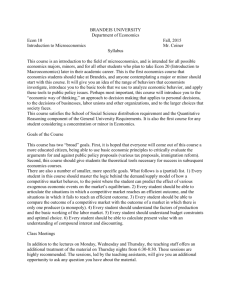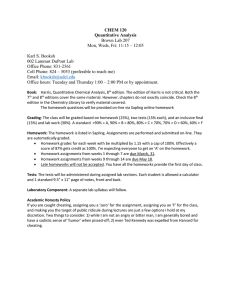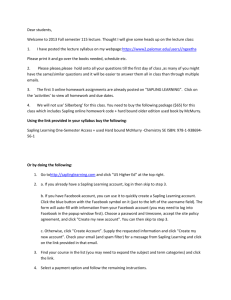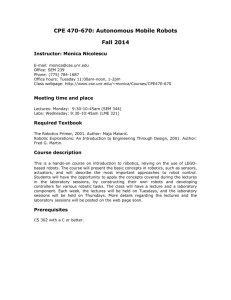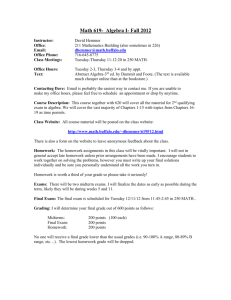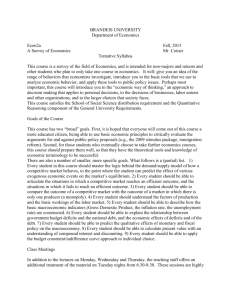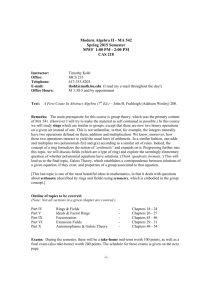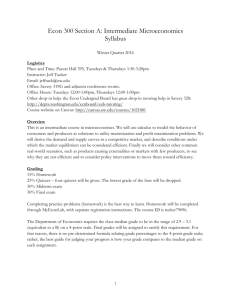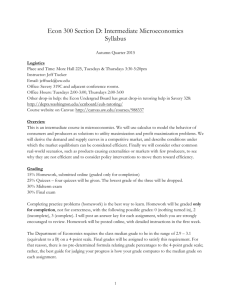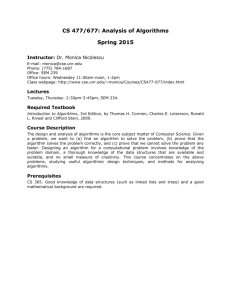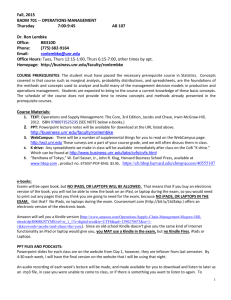Class Syllabus
advertisement
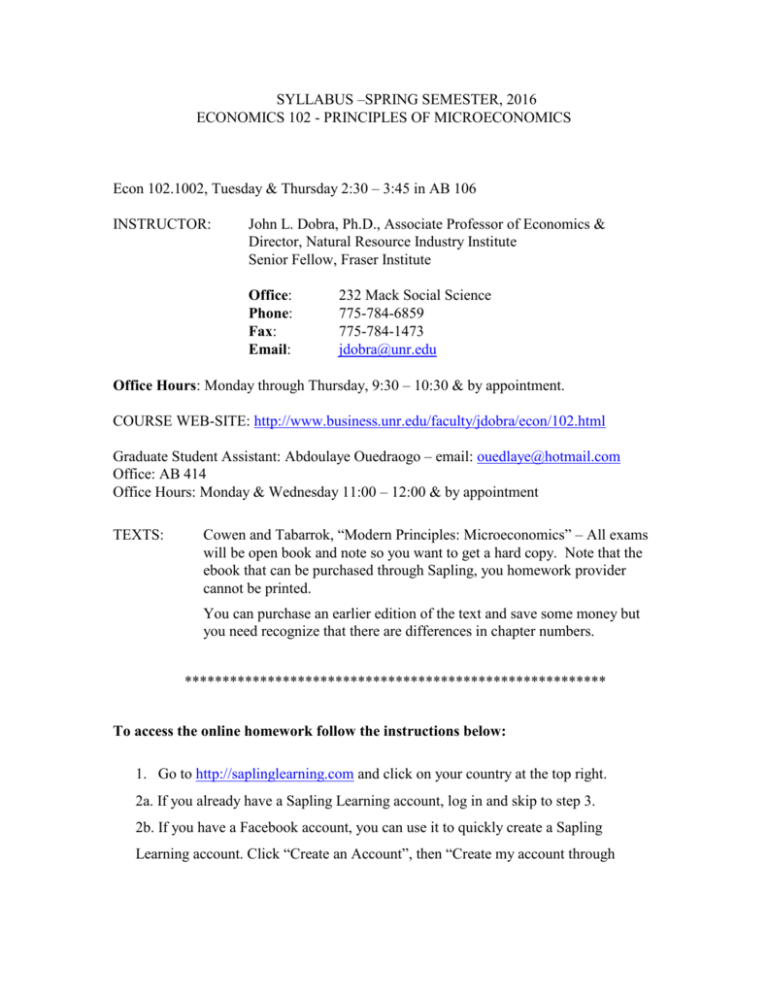
SYLLABUS –SPRING SEMESTER, 2016 ECONOMICS 102 - PRINCIPLES OF MICROECONOMICS Econ 102.1002, Tuesday & Thursday 2:30 – 3:45 in AB 106 INSTRUCTOR: John L. Dobra, Ph.D., Associate Professor of Economics & Director, Natural Resource Industry Institute Senior Fellow, Fraser Institute Office: Phone: Fax: Email: 232 Mack Social Science 775-784-6859 775-784-1473 jdobra@unr.edu Office Hours: Monday through Thursday, 9:30 – 10:30 & by appointment. COURSE WEB-SITE: http://www.business.unr.edu/faculty/jdobra/econ/102.html Graduate Student Assistant: Abdoulaye Ouedraogo – email: ouedlaye@hotmail.com Office: AB 414 Office Hours: Monday & Wednesday 11:00 – 12:00 & by appointment TEXTS: Cowen and Tabarrok, “Modern Principles: Microeconomics” – All exams will be open book and note so you want to get a hard copy. Note that the ebook that can be purchased through Sapling, you homework provider cannot be printed. You can purchase an earlier edition of the text and save some money but you need recognize that there are differences in chapter numbers. ******************************************************** To access the online homework follow the instructions below: 1. Go to http://saplinglearning.com and click on your country at the top right. 2a. If you already have a Sapling Learning account, log in and skip to step 3. 2b. If you have a Facebook account, you can use it to quickly create a Sapling Learning account. Click “Create an Account”, then “Create my account through Facebook”. You will be prompted to log into Facebook if you aren't already. Choose a username and password, then click “Link Account”. You can then skip to step 3. 2c. Otherwise, click "Create an Account". Supply the requested information and click "Create My Account". Check your email (and spam filter) for a message from Sapling Learning and click on the link provided in that email. 3. Find your course in the list (you may need to expand the subject and term categories) and click the link. 4. If your course requires a key code, you will be prompted to enter it. 5. Your course requires payment, select a payment option and following the remaining instructions. 6. You will see a “Grace Period” for payment. That means you can use the site without paying until that date. 7. Note that there are “Practice” problems and “Graded” problems. The “Practice” problems are not part of your grade. 8. The due date for all assignments is midnight the day of the final exam – December 16. Once you have registered and enrolled, you can log in at any time to complete or review your homework assignments. During sign up or throughout the term, if you have any technical problems or grading issues, send an email to support@saplinglearning.com explaining the issue. The Sapling Learning support team is almost always faster and better able to resolve issues than your instructor. ******************************************************** COURSE WORK: The course reading and lectures will proceed at approximately 1 chapter per week. (We will take slightly more or less class time on various chapters but this pace in reading will get students through all 17 chapters in 15 weeks.) There will be an in-class exam after sections I, and II of the Course Outline below. Each exam will be weighted at 20% of the final course grade. The final exam will be comprehensive and also weighted as 20%, for a total of 60% of the total grade based on exams. In addition to mid-semester and final exams, 10% of the grade will be based on attendance and the final 30% will be based on homework using Sapling, an on-line service. The first exam will be approximately in five weeks from the beginning of the semester, or in the first week of October. The second exam will approximately be in the first week of March. The exact date will be determined by how much material has been covered. Consult https://my.nevada.unr.edu/ for the Final exam schedule, however the exam for this class will be Thursday, May 5 at 12:30 to 2:30 PM. Student Learning Outcomes: By the end of the semester, students should be able to: Demonstrate an understanding of the methods and principles of microeconomic theory, including tradeoffs, opportunity costs, incentive effects, gains from exchange, and marginal decision making. Explain how markets work and how market prices are determined. Show mastery of the theories of demand, supply, consumption, production and cost, perfect competition, monopoly, and imperfect competition. Assess the impact of imperfect information, externalities, and public goods on efficiency and welfare, and evaluate possible public policy remedies. Use theory to analyze economic policy issues. Analyze social/human conditions by understanding how the interests of individuals both support and compete with the interests of groups such as firms, societies, and nations. Apply quantitative reasoning to understand and solve problems. Become critical consumers of information by explaining alternative perspectives and structuring hypotheses to evaluate evidence and distinguish between those alternatives. Official College of Business Administration Policy: “Any form of cheating in assignments, projects and exams will result into an automatic grade of F in the course. This may warrant further disciplinary action in consideration with the Director of the MS program and the Chair of the Department.” Students with disabilities The College of Business Administration and the Economics Department support providing equal access for students with disabilities. If you have a disability and will be requiring assistance, please contact me and the Disability Resource Center (Thompson Building, Suite 101) as soon as possible to arrange for appropriate accommodations. Academic Success Services Academic Success Services: Your student fees cover usage of the Math Center (784-4433 or www.unr.edu/mathcenter/), Tutoring Center (784-6801 or www.unr.edu/tutoring/), and University Writing Center (784-6030 or www.unr.edu/writing_center). These centers support your classroom learning; it is your responsibility to take advantage of their services. Keep in mind that seeking help outside of class is the sign of a responsible and successful student. Lectures Surreptitious or covert video-taping of class or unauthorized audio recording of class is prohibited by law and by Board of Regents policy. This class may be videotaped or audio recorded only with the written permission of the instructor. In order to accommodate students with disabilities, some students may have been given permission to record class lectures and discussions. Therefore, students should understand that their comments during class may be recorded. COURSE OUTLINE: I. Basic Concepts – Supply and Demand: Chapters 1 – 7 & 9 EXAM #1 (20%) (Exam #1 will probably be held in the first week of March) II. Firms and Factor Markets: Chapters 10 - 13 EXAM #2 (20%) (Exam #2 will probably be held in early to mid April.) III Miscellaneous Topics: Chapters 15 – 19 FINAL EXAM (20%) Important Dates: Final Exam – Thursday, May 5, 12:30 – 2:30 in AB 106.
